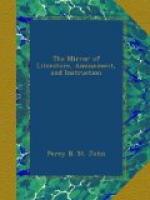It must be somewhat surprising to those who over-rate the matter-of-fact character of the English people, that so great a majority of them are attached to dancing. Among rank and wealth this amusement admits of a finer display of beauty and artificial decoration than almost any other recreation; for nothing can be more splendid than a brilliantly illuminated and well-filled ball-room. Dancing among the middle classes of society is equally mirthful though not of so ostentatious a character, and it is a question whether the latter, being free from the alloy of fashionable follies, are not more exhilarated by sweet sounds than their wealthy superiors. But the mushroom aristocracy and pride of purse often operate as checks to the enjoyment of both these classes; and splendid dancing accommodations sometimes put an end to the amusement. At Dorking, in Surrey, attached to one of the inns is a ball-room, which cost the builder L12,000, and here is one, or at most three balls during the year, while at scores of places within our recollection, of less consequence, there are monthly and even weekly balls; and we are inclined to think these periodical recreations of great importance to the happiness of country towns. But there is a species of intoxication sometimes arising from them—that of dancing all night, to suffer from exhaustion and rheumatism on the following day—an evil easy of remedy, by such amusements being more frequent and less protracted. The influence on the character of the people would probably be that of rendering it more even, from the admixture or reciprocation of pleasure and business being more proportional. This plan would get rid of much of the ostentation and expense of a country ball, and would ultimately prove the best antidote to the sins of scandal.
As we have spoken of public dancing in the time of Henry VII., we will show that the enormous sums paid to artists have nourished their conceit to an alarming height. Pitrot, the Vestris of his day, was a consummate specimen of this effrontery. At Vienna, he chose to appear only in the last act of the ballet. The emperor desired him to come forth at the end of the first; Pitrot refused; the court left the opera, and then Pitrot told the dancers they would have a hop by themselves, which they did. However, this was forgiven; and, at his departure, he was presented with the emperor’s picture, set with brilliants. Pitrot received it with sang froid, pressed his thumb upon the crystal, crushed the picture to pieces, adding, “Thus I treat men not worthy of my friendship.” This fellow behaved equally ill in France, Prussia, and Russia; but, at length, scouted by all his patrons, and, after giving his thousands to opera girls, he wandered about Calais in rags and poverty. Farinelli, after accumulating a fortune in England, built a superb mansion in Italy, which he called the English Folly.[1]




